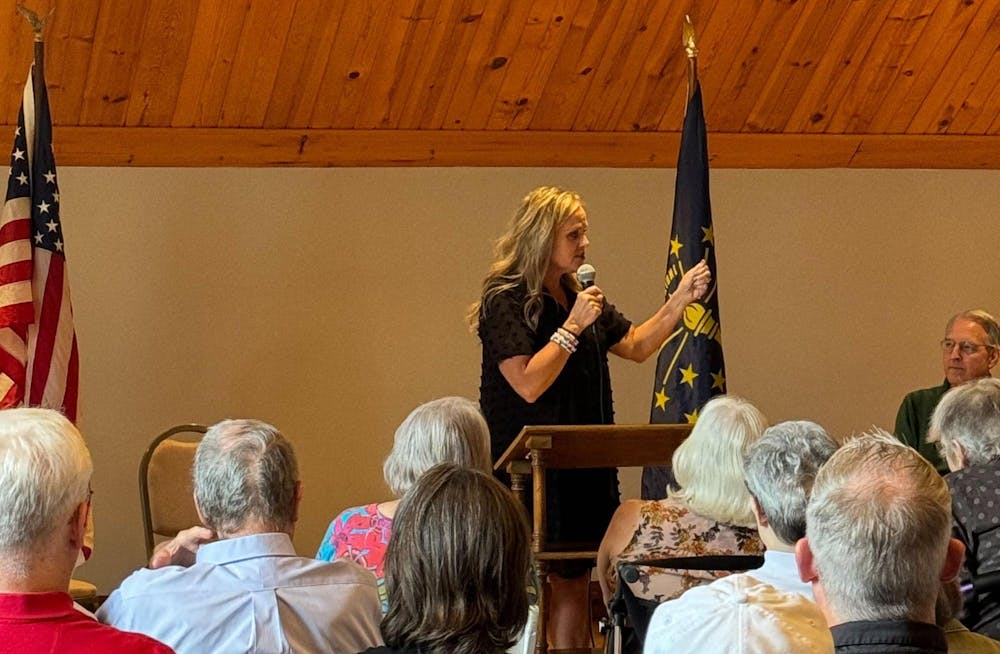If elected governor, Democrat Jennifer McCormick wants change in Indiana’s education system.
In her speeches, she frequently cites Indiana’s ranking near the bottom of states in bachelor’s degree attainment — less than 30%. That’s leaving her concerned about the future of the state. Her education plan would push high school graduates toward colleges while her opponents, and the current state government, seek to implement more trades instruction.
As governor, she’d enjoy various powers over IU, including influence on budget appropriations coming from the Statehouse, trustee selection and policy enforcement. In an interview with the Indiana Daily Student, McCormick answered how she would go about university issues.
Board of Trustees
McCormick would have the opportunity to appoint six members to IU’s Board of Trustees — one student member on a two-year term, along with five other appointees on three-year terms. Those appointments would begin as current trustees’ terms expire in 2025, along with several throughout the rest of her term. McCormick said she wasn’t able to comment on the board’s current performance.
“I haven’t done enough homework on the board to be able to do that at this time,” she said. “But I know too it’s a big decision, and when I get to that point, I’ll make sure I do my due diligence.”
Regardless, she said she would only nominate those with a “passion for higher education” and proven competency.
“A lot of people are depending on them to get it right,” McCormick said.
Rhetoric and tenure
One of the largest controversies in Indiana’s higher education came last year when the legislature passed Senate Enrolled Act 202, which increased state oversight of universities and changed conditions for tenure. It requires universities to prohibit faculty members from receiving tenure or promotions if they are deemed unlikely to foster free inquiry and expression, or unlikely to give learning material from a variety of standpoints.
McCormick said the law threatens to chase good professors and students away from Indiana. Several protests last semester condemned the then-bill, along with other issues facing IU.
“For me, it’s about taking care of and attracting good people to be at Indiana University, and then retaining them,” she said. “And you don’t do that by putting rhetoric out there that’s putting people at risk.”
As governor, McCormick would have a variety of options to combat SEA 202’s effects. She said she’d work with the Commission of Higher Education, other state agencies and the general assembly, where her running mate Terry Goodin would come in.
Goodin, the Democrats’ nominee for lieutenant governor, served in the Indiana House of Representatives for 20 years. McCormick said his experience in the chamber would help her work with the legislature more effectively.
“He has done an amazing job for 20 years at the Statehouse to work across the aisle,” McCormick said.
Indiana State Police
Among IU’s controversies last semester was Indiana State Police’s response to the pro-Palestinian encampment at Dunn Meadow. The agency had put a sniper position on the roof of the Indiana Memorial Union and was involved in the forceful arrests of 57 protesters.
The ISP superintendent — Doug Carter — reports to the governor, who can choose to reappoint the current superintendent or choose a new one. McCormick declined to answer whether she would keep Carter on as the head of the agency.
ISP’s response to the protests, along with Carter’s misleading and inaccurate statements about the protesters’ rhetoric, garnered criticism from IU students, faculty and the community at large. He had told multiple news sources that protesters said “we are Hamas” and encouraged “the death of the Jewish people globally.”
“The issue with that is, we always have to have student safety and order always at the forefront,” McCormick said. “And so, state police is involved with that, also you have campus police involved with that.”
McCormick connected IU’s encampment to the nationwide movement of college campus protests and said that if any student feels threatened, “that’s student safety.”
Who she would appoint for ISP superintendent is still up in the air, McCormick said. But she said she knows Carter well — and that at this point, she won’t disclose who she would appoint.
“I think he has a huge, massive job,” McCormick said. “I respect the decisions he makes, but you know, nothing about that is easy. At the forefront, you’ve got to take the information and the knowledge that he has at hand, which I wasn’t privy to, and to make the best decision.”
Graduate workers’ strike
Last semester, the Indiana Graduate Workers Coalition entered a three-day strike, calling for increased wages based on MIT’s living wage calculator, approximately $27,973 for 10-month graduate workers and $33,568 for 12-month graduate workers in April. They also called for IU to recognize their union.
McCormick said she was broadly supportive of the unions’ goals, citing Indiana’s low wage growth.
“I respect unions, I respect their right to strike and do what they can in their purview to get those wages up,” she said. “When their wages are higher, we all benefit from that.”




